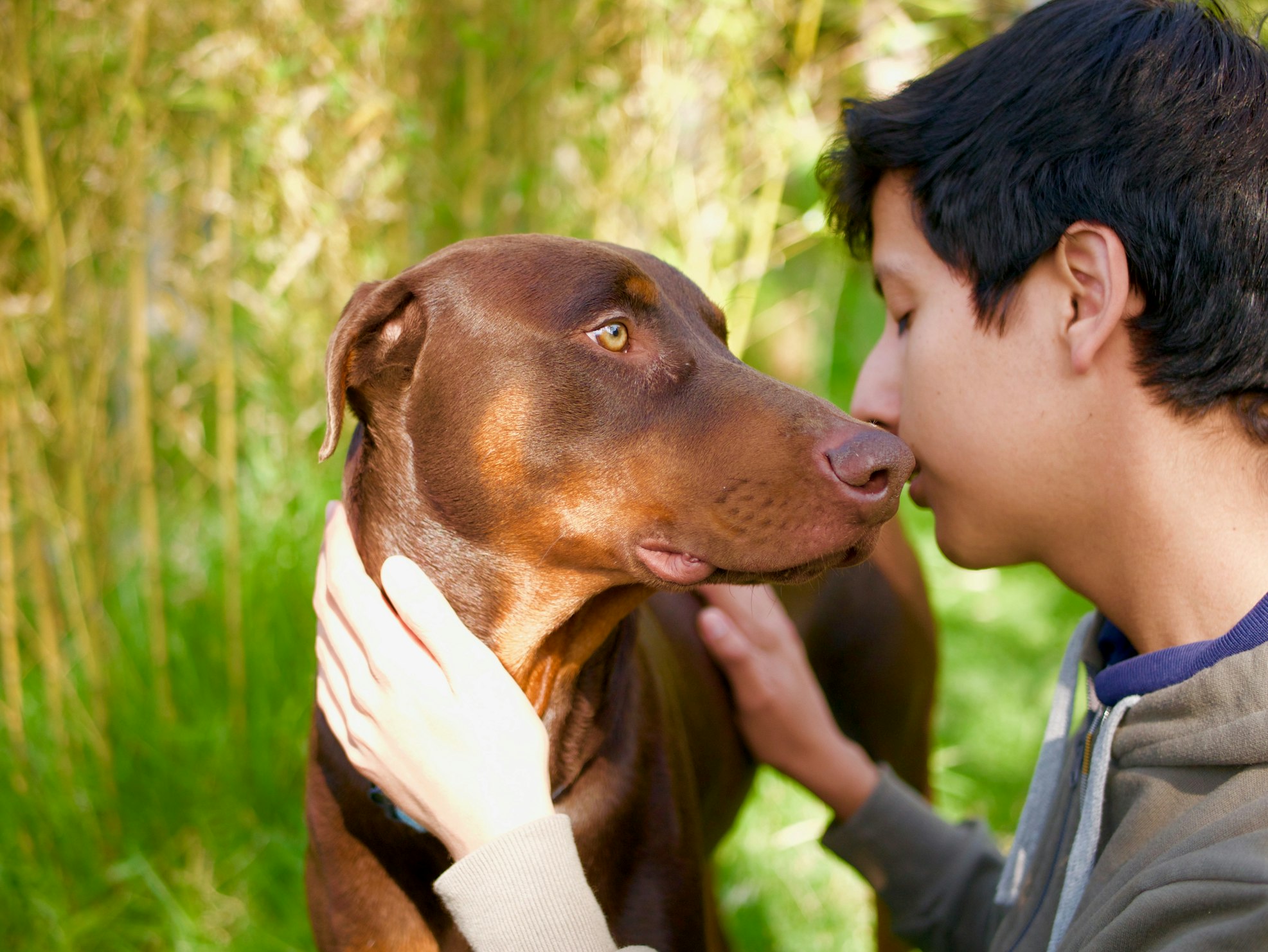Doberman Pinscher Health Issues: A Comprehensive Insight
Doberman Pinscher Health Issues: A Comprehensive Insight
Doberman health issues often belie their powerful appearance. With their athletic frame and captivating gaze, they command attention effortlessly. Yet, much like a coveted sports car, they possess both strength and susceptibilities. Their impressive exterior conceals vulnerabilities that require understanding and meticulous care, similar to maintaining a luxury vehicle.
Genetic Concerns: More Than Meets The Eye
Much like how we inherit our physical features and potential health vulnerabilities from our lineage, Dobermans too carry a genetic legacy. These majestic canines, while bestowed with distinctive looks, might also bear the weight of inherited health concerns. Their genetic makeup, shaped by their breed’s history, can predispose them to certain ailments. Just as our DNA tells a tale of our ancestry and health propensities, the Doberman’s genes narrate their own story of beauty and susceptibility.
Blood Woes: The Reality of Von Willebrand’s Disease (vWD)
Ever noticed how a small paper cut stops bleeding after a few moments? But what if it didn’t? That’s the challenge our Doberman pals face with vWD. This inherited disorder messes with their blood’s ability to clot, turning even the tiniest scratch into a prolonged ordeal.
Symptoms:
- Prolonged bleeding after injury or surgery.
- Frequent nosebleeds or gum bleeding.
- Blood in urine or stool.
- Excessive bleeding during female heat cycles or after whelping.
Treatment:
- Blood transfusions for severe bleeding episodes.
- Medications, like desmopressin, that boost blood clotting factors.
- Avoiding certain medications known to affect clotting.
- Regular check-ups with the vet to monitor the condition.
Joint Troubles: The Tale of Hip Dysplasia
Who said hip troubles were just for humans? Dobermans, despite their robust appearance, aren’t immune to hip dysplasia. It’s as if they’re constantly walking on an uneven path, causing discomfort and long-term distress.
Symptoms:
- Limping or favoring one leg over the other.
- Decreased activity and reluctance to run, jump, or climb stairs.
- Stiffness or pain when getting up.
- Audible “clicking” sound when walking.
Treatment:
- Pain management with anti-inflammatory drugs.
- Physical therapy or controlled exercise regimens.
- Joint supplements, like glucosamine and chondroitin.
- In severe cases, surgical interventions such as total hip replacement.
Nature’s Curveballs
Even the mightiest have their weak spots. For Dobermans, it’s not always about genetics. Some external factors can sneak in, causing a wrinkle in their otherwise smooth sail. It’s akin to a warrior’s armor having a few vulnerable chinks.
The Twisted Tale: A Bloating Concern
Ever felt so stuffed that you thought you’d pop? For Dobermans, it’s not just about overindulging on treats. When they experience bloat, their stomach literally twists. It’s not just a tummy ache – it’s an urgent, potentially life-threatening situation.
Symptoms:
- Distended abdomen
- Restlessness or pacing
- Attempts to vomit with no success
- Labored breathing
- Excessive drooling
Treatment:
- Immediate veterinary care is essential.
- Decompression of the stomach may be required.
- Fluid therapy to stabilize shock.
- Surgery to position the stomach correctly and prevent future occurrences.
- Dietary management and regular feeding schedules.
Tender Hearted Giants: Cardiomyopathy
Behind the powerful stance of a Doberman lies a heart that can sometimes falter. Cardiomyopathy sees their mighty heart muscles gradually deteriorate. Picture a seasoned athlete suddenly gasping in a leisurely jog; that’s how sudden and alarming it can be.
Symptoms:
- Coughing or difficulty breathing.
- Lethargy or decreased energy.
- Fainting or sudden collapse.
- Swollen abdomen due to fluid accumulation.
- Irregular heartbeats.
Treatment:
- Regular cardiac evaluations by a veterinarian.
- Medications to strengthen heart contractions and control irregular heartbeats.
- Low-sodium diet to reduce fluid accumulation.
- Limited strenuous activities or exercises.
- Regular monitoring and check-ups to adjust treatments as necessary.
The Dark Side of Popularity: Overbreeding
Being in demand isn’t always a blessing. The soaring popularity of Dobermans has unfortunately given rise to overbreeding. This practice, driven by high demand, doesn’t just affect the breed’s lineage but can lead to severe health challenges that might have been avoidable otherwise.
The Price of Uniqueness: Albinism in Dobermans
A white Doberman might catch your eye, reminiscent of nature’s rare albino creatures. However, this unusual coloration in Dobermans often stems from overbreeding. Their pale coat, while striking, signifies more than just a color anomaly—it flags potential health vulnerabilities.
Symptoms:
- Lighter eyes, often blue or pale in color.
- Very pale or pink nose, lips, and eye rims.
- Susceptibility to sunburn and skin cancers.
- Potential vision problems.
Treatment:
- Use of sunscreens or protective clothing to prevent sunburn.
- Regular vet check-ups to monitor for skin issues or cancers.
- Careful monitoring and, if necessary, vision aids or treatments.
- Providing shaded areas or limiting exposure to direct sunlight.
Dimming Vision: Progressive Retinal Atrophy (PRA) in Dobermans
The vibrant world Dobermans once knew starts to fade with the onset of PRA. Their retina undergoes a gradual deterioration, casting shadows where once there was light, and in the worst cases, plunging their world into darkness.
Symptoms:
- Night blindness; difficulty seeing in low light.
- Dilated pupils with a reflective, greenish sheen.
- Bumping into objects or disorientation.
- Gradual vision loss progressing to complete blindness.
Treatment:
- Regular eye exams to monitor progression.
- Antioxidant supplements, which may slow the progression in some cases.
- Adapting the home environment to ensure the dog’s safety.
- Training and adaptive techniques to help the dog navigate their world.
Health Enigmas in Dobermans
In the vast realm of health, there are concerns that elude straightforward categorization, much like the perplexing case of vanishing socks in our laundry. These anomalies, neither typical nor common, nevertheless demand our attention and care. For our Dobie companions, these health mysteries may appear infrequent, but remain significant. Always keep an eye out, as unpredictability is often the essence of nature.
Energy Depleted: Hypothyroidism in Dobermans
Just as we experience sluggish days when our energy seems drained, imagine that feeling persisting daily. For Dobermans suffering from hypothyroidism, it’s akin to perpetually operating on a low battery. Their internal engine, so to speak, struggles to rev up, making even routine activities a challenge.
Symptoms:
- Lethargy and reduced activity levels
- Weight gain without an increase in appetite
- Hair thinning or hair loss
- Dry, flaky skin and recurring skin infections
Treatment:
- Daily oral medication containing thyroid hormone
- Regular blood tests to monitor thyroid levels
- Diet adjustments and supplements as recommended by a vet
- Consistent vet check-ups to evaluate the treatment’s effectiveness.
Distinct but Delicate: Color Mutant Alopecia in Blue-Coated Dobermans
The allure of a unique blue coat on a Doberman is undeniable. Yet, this captivating hue carries an underlying vulnerability: Color Mutant Alopecia. Much like humans with incredibly sensitive skin, these blue-coated Dobermans can react adversely to even minor irritants, making their skin prone to infections.
Symptoms:
- Hair thinning or hair loss, especially on the trunk
- Dry, scaly skin
- Recurring skin infections or inflammations
- Discoloration or darkening of the skin in affected areas
Treatment:
- Medicated shampoos and topical treatments for skin infections
- Omega fatty acid supplements to support skin health
- Regular vet check-ups to monitor skin condition and adjust treatments
- Protective clothing or sunscreen to prevent sunburn, if advised by a vet.
Forewarned is Forearmed: The Power of Prevention
Being informed isn’t just about knowledge; it’s about empowerment. Understanding the potential health challenges faced by your Doberman places you a step ahead. By being proactive and vigilant, you can catch potential issues early, safeguarding your Doberman’s well-being and ensuring many joyful years together.
Prioritizing Vet Visits
Dobermans, much like us, benefit significantly from regular health screenings. Just as we wouldn’t neglect our annual physicals, it’s crucial for these majestic canines to have frequent vet appointments. These visits aren’t just routine; they can be the key to spotting and addressing health concerns early on, ensuring minor issues don’t transform into major complications.
Promoting Wellness Through Balance
Both humans and Dobermans thrive when given proper nutrition and adequate physical activity. For your Doberman, a well-rounded diet paired with regular exercise is vital for warding off potential health challenges. By being proactive about their lifestyle choices, you pave the way for a more energetic and healthier companion.
Balanced Diet for a Doberman:
- Proteins: Opt for high-quality sources like lean chicken, beef, and fish.
- Carbohydrates: Whole grains such as brown rice or quinoa are excellent choices.
- Fats: Omega-rich sources like fish oil or flaxseed help maintain a shiny coat.
- Vitamins and Minerals: Fresh vegetables like carrots, peas, and green beans offer necessary nutrients.
- Water: Always ensure fresh water is readily available to keep them hydrated.
Conclusion: Doberman Health Issues
To many, Dobermans are not merely pets but cherished family members. Their health, therefore, holds the same weight as that of any loved one. By staying informed and taking preemptive measures against health concerns, we can pave the way for countless happy memories with these loyal friends. After all, the love and devotion they provide deserves nothing less than our utmost care in return.
FAQs about Doberman Health Issues and Care
- Will my Doberman inevitably encounter these health issues?
Not at all! While some Dobermans might be genetically predisposed to certain conditions, many potential health problems can be staved off with vigilant care. Being well-informed and proactive can make all the difference in your dog’s health journey. - How regularly should I schedule vet visits for my Doberman?
For younger Dobermans, a vet visit every six months is a smart routine. However, as they mature, yearly check-ups generally suffice, unless specific health issues arise. Regular check-ups ensure early detection of potential concerns. - Is it possible to prevent Hip Dysplasia through a healthier lifestyle?
While Hip Dysplasia has a strong genetic component, lifestyle factors also play a role. Maintaining an optimal weight and ensuring consistent, moderate exercise can play a significant part in reducing the risk of this condition in your Doberman. - My Doberman has a white coat; does that mean it’s an albino?
Not necessarily. While some white-coated Dobermans might be albinos, not all are. It’s crucial to consult with a vet for a definitive diagnosis, as albinism can come with unique health implications for your pet. - What’s the typical lifespan of a Doberman?
With diligent care, love, and a balanced lifestyle, Dobermans can enjoy a healthy lifespan of around 10 to 13 years. Prioritizing their health through regular vet visits and a nutritious diet can have a significant positive impact on their longevity.











Comments are closed.